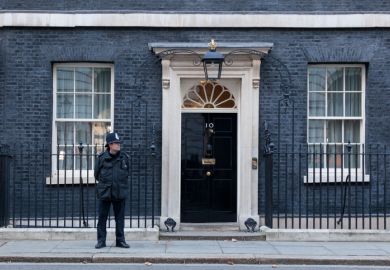Philip Augar has said his review’s decision to recommend a £7,500 fee cap in England partly reflected its view that universities had escaped austerity, also declaring that it was “not in our remit to protect failing institutions” and that universities in financial trouble were guilty of “bad management”.
The chair of the independent panel for the government’s review of post-18 education made the comments in an appearance on 25 June before the House of Lords Science and Technology Committee, which was taking evidence about the report.
Some in the sector have questioned how the panel reached its decision to recommend a fee cap of £7,500 – which the panel also recommends should be accompanied by full replacement funding from the Treasury, leaving the average unit of resource unchanged but with funding shifted towards priority subjects. The study of universities’ costs of provision commissioned for the review, carried out by KPMG, found that the lowest cost of provision of any subject group – for English, law and modern languages – was £8,801 per undergraduate.
Dr Augar said that “further analysis of the data” had “revealed that that £8,800 contains a 10 per cent margin called the margin for sustainability and investment, which is effectively a discretionary provision against future expenditure”. He added that “in our calculations, therefore, we thought that simply adjusting for this would take the base cost down to £8,000 or just below”.
In addition, Dr Augar said the panel judged that the trebling of tuition fees to £9,000 had ushered in “a windfall for the sector”. He added: “We judged that not all of that expenditure had landed in the best place. We judged that universities had been through a golden period while other sectors of the economy and other parts of the public sector were experiencing a decade of austerity.
“And we felt that it didn’t take a great deal of imagination or analysis to conclude that a reasonable cost of provision would lie below £8,000, and in fact some way below £8,000.”
The panel had “thought quite hard” about a £6,500 cap but “felt that was excessively punitive”, he added.
Dr Augar said: “It was the committee’s balanced judgement that £7,500 plus…a full top-up across the sector through the teaching grant would constitute a reasonable cost of provision and would mean that no single undergraduate was paying more than the cost of provision.”
Dr Augar was also asked whether the panel’s plans could mean some universities “going under”.
“We were surprised that higher education institutions would be in unplanned deficit given the growth in income institutions have had over the past several years,” said Dr Augar.
Many of the universities with large deficits argue that the blame lies with government policies: with the abolition of student number controls having led to dramatic falls in recruitment at some universities, and with Home Office restrictions on overseas recruitment having had a financial impact.
Dr Augar said: “It couldn’t be the panel’s business and it’s not in our remit to protect failing institutions. It’s a matter frankly for the [Office for Students] and the chairman [of the OfS] has already spoken about that.
“These have been very benign, very favourable years for the HE sector. There has scarcely been a seven-year period like it. I find it absolutely remarkable that, under those circumstances, higher education institutions – any – should be in financial difficulty.”
Given “the large number” of universities “doing well”, that “speaks to me of bad governance and bad management” in the universities faring poorly, he added.
Asked about fears that fees could be cut without full replacement income being provided by the Treasury, Dr Augar said: “We’re not able to speculate on what this government or a future government might do with the recommendation [to provide full top-up funding], but it’s part of a coherent package. All parts are intended to fit together.”
Register to continue
Why register?
- Registration is free and only takes a moment
- Once registered, you can read 3 articles a month
- Sign up for our newsletter
Subscribe
Or subscribe for unlimited access to:
- Unlimited access to news, views, insights & reviews
- Digital editions
- Digital access to THE’s university and college rankings analysis
Already registered or a current subscriber? Login








